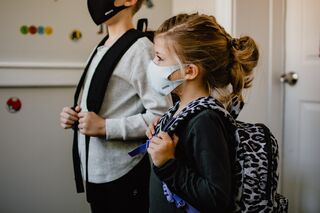Health
5 Ways COVID Has Changed Children's Mental Health
How can we better support and help children during the pandemic?
Posted April 7, 2021 Reviewed by Devon Frye
This guest piece is written by Sarah Hall.
If you have interacted closely with children or their parents over the past year, there is a good chance that you have glimpsed the effects of the pandemic on young people. Limited research points to increases in internalizing symptoms (such as anxiety and depression), externalizing symptoms (such as disruptive and oppositional behaviors), and stress-related physical symptoms (such as headaches and stomachaches) in children and teenagers since the start of the COVID-19 pandemic. There are a number of reasons why children’s mental health has suffered over the past year.

Disruption of routines. The pandemic has resulted in significant disruptions to everyday routines. Essentially all children who attend school outside of the home have experienced multiple, significant changes to their school routines as schools have implemented measures such as remote learning, shortened school days, social distancing, and masking. Youth whose weekly schedules involved participation in school clubs, sports practices, or music lessons found those activities suddenly ground to a halt.
Many children have also experienced changes to their routines at home, including family interactions and activities and even sleep schedules, as the result of parents working remotely or family financial stressors. Given the importance of predictable routines for mental health, these many changes may result in a sense of distress and instability that leads to symptoms such as depression or acting out behavior.
Social disconnection. In addition to changes in school and family routines, most children have experienced significant decreases in their opportunities to interact with people outside their immediate family. Children have to stay six feet away from their classmates at school, they may be discouraged from going to friends’ houses or playing outside with neighbors, and visits with extended family members have been postponed indefinitely. Given the importance of social support for mental health, this social disconnection may lead to increased feelings of distress in addition to limiting the resources children can draw from to cope with the many stresses of life during a pandemic.
Increased stress in parents. Adults also have experienced major disruptions to their routines and increases in their stress levels as the result of the pandemic. Research suggests that stress can have a major impact on parenting behaviors, leading parents to be less responsive to their children and to discipline more consistently and harshly. Distress and problematic behavior exhibited by children as the result of disruptions to their own routines may in turn be exacerbated when highly stressed parents respond to their children in ways that are less warm, sensitive, and consistent than usual.
Messages about danger and threats. In addition to changes in their routines and interactions with caregivers, youth are exposed to messages about COVID-19 and interactions with other people that communicate a sense of constant threat and danger. In order to help them understand and display behaviors that are recommended by health officials, adults tell children that we need to stay home, keep our distance from other people, wear a mask at all times at the store and at school, and do everything we can to keep from catching or spreading COVID-19. (One of my children recently put on a magic show for our family in which he told us there would have been more people in the audience if everyone didn’t have to stay six feet apart.) These messages, while important, may lead some children to internalize a sense of danger that increases their attentiveness to potential threats, leading to constant feelings of worry or increases in behavior such as tantrums and other outbursts.
Loss and grief. As over 550,000 Americans and 2.5 million people worldwide have died of COVID-19, some youth have experienced the death of a loved one as the direct result of the pandemic. Significant losses always have the potential to increase mental health symptoms, but grief may be an especially challenging experience to manage on top of the stress and distress that children and families are already experiencing.
The rise we see in mental health problems in youth parallels increases in symptoms in adults as well, though there are some reasons why the experiences of the past year may affect children in unique ways. One major difference between the experiences of adults and children is the degree of understanding and larger perspective that we possess. It is generally easier for adults to comprehend that this, too, shall pass and to take actions to cope with stressful situations, even those as challenging as a year-long, worldwide pandemic.
For children, in contrast, a year is a very long time in the course of their short lives, and they generally have little control over their environments and the changes that have been imposed on them due to factors they may not fully understand. If you are an adult who is now working from home, you might be able to set up a cozy home office and focus on the increased sleep you are getting as a result of having no commute. Children whose school experiences have shifted from an in-person, predictable routine to spending the day on Zoom or in a socially-distanced classroom may feel more out of control and distressed by these major disruptions to their environments than adults.
How do we help and support the children in our lives during this difficult time? We may not be able to change the dynamics of school or the availability of extracurricular activities, but we can aim to create a sense of safety and stability at home. Families might create new COVID-safe routines, such as family movie nights or Sunday afternoon hikes. We can encourage youth to connect with other people despite the physical distance, such as video chats, masked/outdoor playdates, or letter writing. We also need to examine our own well-being as parents or other significant adults, as the tone of our outlooks and interactions with children goes a long way toward setting the stage for how they will view and cope with this unprecedented time in their lives.

About the Author: Sarah E. Hall (Ph.D., Penn State University) is an Associate Professor of Psychology, Counseling, and Family Therapy at Wheaton College (Illinois). Her teaching and research focus on child clinical and developmental psychology, including the factors that promote and interfere with mental health and well-being. Her newest book, Treatment of Childhood Disorders: Evidence-Based Practice in Christian Perspective, is forthcoming.




